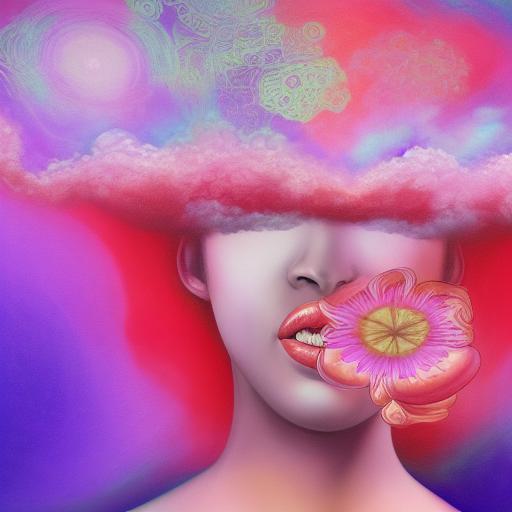How to write this prompt?
Here’s a breakdown of the different parts of the prompt and how they influence the generated image:
- Subject: “The woman holding a laughing flower in a close-up psychedelic artwork” – This sets the main focus of the image and provides details about what the woman is doing and what she is holding.
- Expression: “With a highly detailed view of her expression” – This emphasizes the importance of the woman’s facial expression in conveying the mood and tone of the image.
- Color scheme: “The color scheme has changed to shades of pink and purple, giving the painting a dreamy and surreal quality” – This provides a specific color palette for the image, which sets the overall mood and atmosphere.
- Volumetric fog: “The volumetric fog in the background creates a mystical atmosphere” – This adds depth and dimension to the image and helps to create a sense of atmosphere.
- Backlighting and bokeh: “The use of backlighting with bokeh effect adds to the psychedelic effect” – This adds visual interest and texture to the image and helps to create a sense of depth.
By including these different elements in the prompt, we can provide specific details for the AI to incorporate into the generated image. For example, the use of a specific color scheme and lighting technique can help to create a specific mood or atmosphere, while the emphasis on the woman’s expression can help to convey a specific emotion or tone. The prompt should be detailed enough to guide the AI, but not so prescriptive that it limits the AI’s creativity in generating the image.
What is the purpose of using a bokeh effect in photography?
The bokeh effect is used to create a soft, out-of-focus background in a photograph. This technique is often used in portrait photography to separate the subject from the background and to create a more visually interesting image.
How to create a dreamy and surreal color scheme in a painting?
To create a dreamy and surreal color scheme, you can use soft, pastel colors like pink and purple. You can also experiment with blending different colors together to create a gradient effect, or use a monochromatic color scheme with different shades of the same color.
Why is facial expression important in art?
Facial expression is important in art because it can convey a wide range of emotions and help to communicate the mood or tone of the artwork. By focusing on the details of the expression, artists can create a more engaging and emotionally resonant image for the viewer.
Can AI art generation prompts be used for commercial purposes?
Yes, AI art generation prompts can be used for commercial purposes, but it depends on the specific terms and conditions set by the AI art generator or the organization that provides the service. Some AI art generators may have restrictions on the use of their artwork for commercial purposes, while others may allow it but require attribution or a licensing fee.
However, it’s important to note that using AI-generated artwork for commercial purposes may raise legal and ethical concerns. For example, if the AI-generated artwork contains copyrighted material or infringes on someone’s intellectual property rights, it may result in legal consequences. Therefore, it’s important to ensure that the AI-generated artwork is legally and ethically sound before using it for commercial purposes.
Can AI-generated art be improved or edited by humans?
Yes, AI-generated art can be improved or edited by humans. While AI-generated artwork can be impressive in terms of its technical proficiency and unique qualities, it may still lack the subjective creativity and emotional depth that is often associated with human-created artwork.
Therefore, humans can add their own personal touch or style to the AI-generated artwork by editing or improving it in various ways, such as adding or removing elements, adjusting colors or lighting, or altering the composition. In fact, many artists and designers use AI-generated artwork as a starting point or source of inspiration for their own creative work.
However, it’s important to keep in mind that the process of improving or editing AI-generated artwork requires a certain level of skill and expertise. It’s not simply a matter of making superficial changes to the artwork, but rather a process of understanding the underlying principles and techniques involved in creating a visually appealing and emotionally resonant artwork.
Visual Paradigm Online is a powerful design tool that enables users to seamlessly integrate AI-generated art into their graphic designs, resulting in visually stunning and engaging graphics with just a few clicks. With its user-friendly interface and an extensive collection of design templates and assets, Visual Paradigm Online offers a convenient and effortless way to experiment with various styles and layouts until you achieve the perfect combination for your project.


